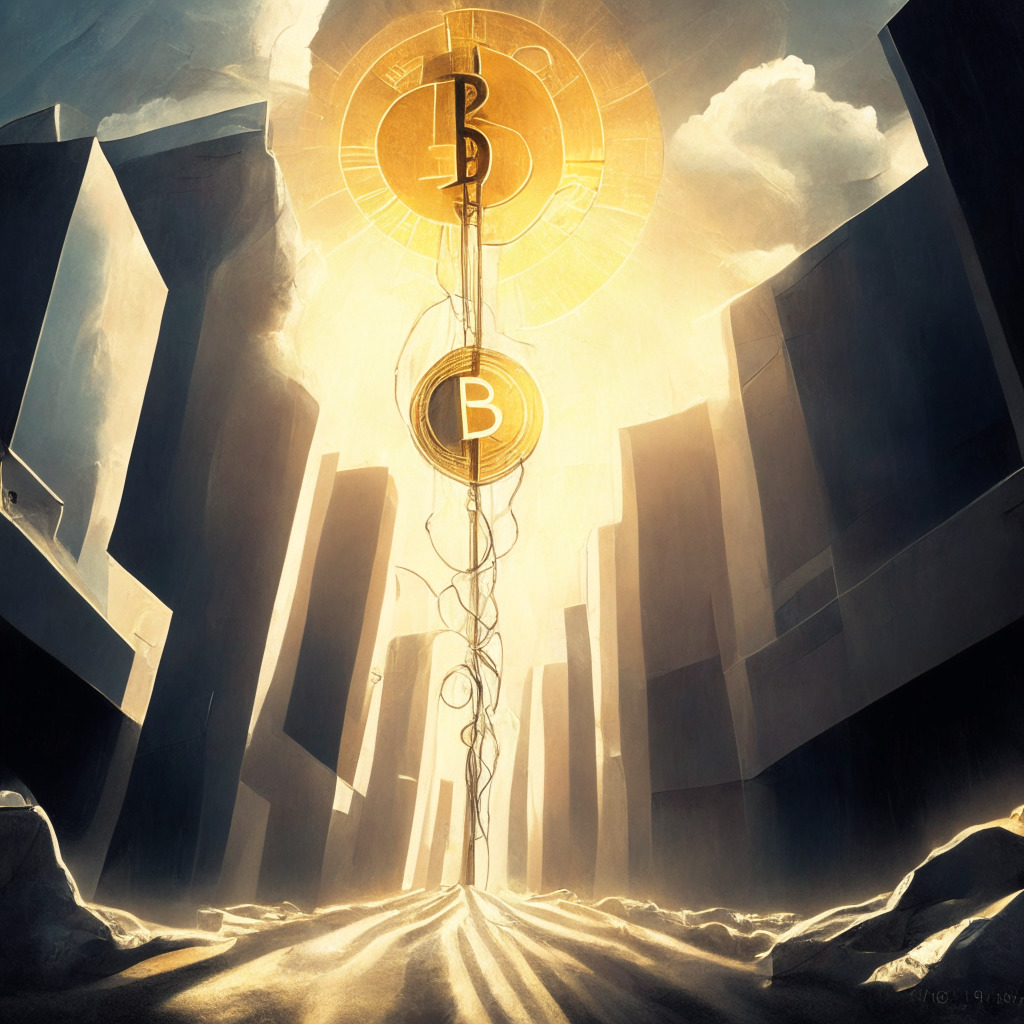Former OpenSea manager, Nathaniel Chastain, though appealing his insider trading charges, opted to serve his three-month prison sentence. Using confidential info for personal gain, Chastain’s misconduct highlights contentious boundaries in crypto trading regulation, reflecting on the volatile nature of blockchain technology adoption.
Search Results for: Blur
Takashi Murakami’s NFT Adventure: Unpredictable Markets yet an Unwavering Faith in Digital Art’s Future
“Japanese artist Takashi Murakami’s introduction into the cryptoverse with Non-Fungible Tokens (NFTs) was impacted by the 2022 crypto collapse. Despite this, his belief in digital art remains strong, evident in his exhibition at San Francisco’s Asian Art Museum.”
Reinventing Football Fantasy: Sorare’s 3D NFT Cards and the Confluence of AR and Blockchain
Football fantasy game Sorare has innovated the NFT realm by introducing 3D digital football player cards supported by augmented reality (AR). These cards blur physical and digital boundaries to enhance virtual reality. Despite complexity in design scalability, Sorare sees this as an opportunity for progress.
GenTwo’s Bold Move: Revolutionizing Investment Landscape or Silencing Stability?
Fintech platform GenTwo, known for securitization, has raised $15 million in a Series A funding round led by Point72 Ventures, announces the firm. This event raises intended expansion to international presence, promising a significant impact on the global fintech landscape.
Ethereum-based Wallet Scams: The Dark Side of Crypto Convenience or Heightened Awareness Call?
“Scammers exploit MetaMask’s reputation by redirecting users to fake websites via official government website URLs. Unwary users link their MetaMask wallets to these hoax sites, inadvertently giving fraudsters control over their assets. Despite MetaMask’s efforts, such scams have left crypto enthusiasts questioning their holdings’ security.”
Decoding Future Taxes: Is the Metaverse A New Tax Haven or a Revolutionary Taxation System?
“Harvard legal scholar, Christine Kim argues the metaverse should be taxed immediately, as significant wealth is generated by users through real economic activities. Kim proposes immediate taxation and two enforcement methods: platforms withholding taxes or a ‘residence taxation’ module for users.”
Crossing Borders: Crypto Regulation Varies from U.S Celebrities to Chinese Property Laws
“Cryptocurrency regulation is emerging as an international focal point, highlighting distinct differences between jurisdictions. While China’s court recognizes crypto as property, South Korea targets North Korean digital assets. Meanwhile, the London Stock Exchange and OKX embark on blockchain ventures, and MoonPay adapts to UK regulations.”
International Legal Drama Unfolds: How FTX’s Sam Bankman-Fried’s Fraud Case Could Impact Crypto Cities
Sam Bankman-Fried, founder and former CEO of crypto exchange FTX, is facing a fraud trial with allegations including wire fraud. The U.S Department of Justice questions the blurred lines between FTX’s international and U.S. operations, which Bankman-Fried’s defence argues to be legally separate. The fallout of the case could significantly impact the crypto landscape.
Revising Crypto History: Runefelt’s Battle between Reality and Attraction Law
Crypto influencer Carl “The Moon” Runefelt, previously claimed to be a co-founder of cryptocurrency payment platform Kasta, but now insists that he was simply an investor. His sudden change of stance about his involvement and re-purported non-operational role, sparks questions about reliability in the volatile and fast-paced crypto industry.
Empowering Africa with Cryptocurrencies: Challenges and Potentials
The crypto world, particularly Africa, faces challenges in widespread adoption due to lacking infrastructure and education. However, Christian Duffus, founder of Fonbnk, is optimistic for favorable crypto regulations and the development of local decentralized applications to promote unique solutions and possibilities.
OKX’s Ambitious Expansion into India: A Gamble in the Unregulated Cryptocurrency Terrain
Cryptocurrency exchange OKX is aiming to penetrate India’s crypto market, focusing on Web3 applications. Not intending to establish a physical presence, the company plans to hire local employees to expand its wallet services. Despite India’s lack of a formal regulatory framework for crypto trading, OKX is optimistic about being the front-runners once regulations are in place.
Navigating the Choppy Waters: Crypto Regulation’s Impact on Future Market Stability
The future of significant cryptocurrencies like Bitcoin may hinge on regulation. This comes as the U.S. Securities and Exchange Commission (SEC) delayed crucial decisions on spot bitcoin exchange-traded fund (ETF) applications, causing major cryptos to lose their weekly gains. The impact of this emerging era of crypto regulations remains difficult to predictable, posing a paradox of digital currency liberation versus regulatory control.
Bitcoin ETFs and Crypto ATMs: The Balancing Act of SEC Regulations in the Crypto World
“The United States Securities and Exchange Commission (SEC) is delaying its decision on applications for a spot Bitcoin ETF from institutional giants. Additionally, the crypto ATM industry is under scrutiny for alleged illegal behavior and high usage fees, while facilitating convenience and anonymity. Regulatory development is vital for the industry’s well-being and participant safety.”
Crypto Mining & Alternative Energy: Exploring the Environmental Implications of TDF Use
Stronghold Digital Mining, a US-based company, is seeking approval to utilize Tire Derived Fuel (TDF), an unconventional energy source involving shredded tires, for crypto mining. This proposal raises questions on the environmental implications tied to crypto mining and sparks debates about the crypto industry’s path toward sustainability.
EOS Gets Regulatory Approval in Japan: A Milestone for Crypto or a Threat to Anonymity?
EOS, a globally acclaimed cryptocurrency, has gained regulatory approval in Japan, allowing it to be traded against the Japanese yen on regulated exchanges. This marks EOS’s debut on the Japanese exchange BitTrade, highlighting the continued significance of the Asian market to the digital token’s growth. However, while exciting, regulatory acceptance raises questions about possible impacts on anonymity and decentralisation.
Mainstreaming Crypto: The Future of Digital Transactions Unfolds on Social Media Platforms
“Social media giant, X, has established cryptocurrency payments for its global audience, following recent approval from regulatory authorities. This brings good tidings for X’s network of 400 million users who can potentially interactively share via cryptocurrencies, transforming the social media platform into an ‘everything app’.”
SEC’s Maiden NFT-Related Enforcement Action: A Curbing Move or Growing Pains?
U.S. regulators have asked Impact Theory, a Los Angeles firm, to repay investors for an illegal, unregistered securities offering related to non-fungible tokens (NFTs). This ruling, the SEC’s first NFT-related enforcement action, doesn’t imply all NFTs are securities. The company must create a fund to reimburse investors and pay a $6.1 million penalty.
Evergrande Crisis: A Turning Point for Crypto Markets or Catalyst for Chaos?
“The escalating Evergrande bankruptcy saga could instigate global economic turbulence and affect crypto markets, potentially causing a price plunge. However, this could be an opportunity in disguise, as cryptocurrencies, due to their volatility, limited supply, and independence, could prove useful in crisis periods, drawing attention to the merits of decentralized finance solutions and blurring the line between traditional and crypto economies.”
The Battle of Blockchain: Ethical Boundaries vs. Legal Sanctions in the Crypto World
Cryptocurrency regulations are often filled with controversies, as shown in Sam Bankman-Fried’s recent legal predicament. His pre-trial detention ties to alleged witness tampering, resulting in heated court arguments. His predicament invites questions around the balance between defending oneself and crossing ethical boundaries in the crypto world.
AI and Blockchain: Harmonizing the Future of Music Industry or Hitting the Wrong Note?
“The rise of AI and blockchain in the music industry could shift power dynamics and reshape creativity. AI is at the forefront of content creation, blurring lines between imitation and originality. Blockchain technology, touted for transparency, can ensure fair copyright practices and compensation while providing a clear lineage of music content.”
NFTs and the Creative Revolution: Tracing the Success of VR Artist Giant Swan amidst OpenSea’s Royalties Controversy
“In an era dominated by digital aesthetics, Non-Fungible Tokens (NFTs) have soared, offering artists unparalleled creative freedom. Particularly noteworthy is the Australian VR artist, Giant Swan, the first to put a 3D object on-chain. This innovation allows direct artist-collector sales, a leap forward from traditional social media trades. However, OpenSea’s choice to make creator royalties on secondary sales optional creates a significant challenge for creators striving for rightful compensation in an ever-evolving economy.”
Tornado Cash Co-Founder Arrest and Debate on Developer Responsibility in Blockchain Regulation
Tornado Cash co-founder, Roman Storm, was arrested over money-laundering charges. The case has raised debates about responsibility and control within the blockchain industry, particularly for software developers. This controversy suggests that future blockchain regulation is navigating uncertain territory.
Integration of Real-World Assets and DeFi: The Future or a Paradox?
“Pendle Finance aims to integrate real-world assets within the digital finance ecosystem, opening access to traditional financial instruments. While this could attract large, off-chain institutional investors, it raises questions of blurring boundaries between decentralized finance and traditional systems.”
Decoding the Legal Matrix: Tornado Cash, DAOs, and the Future of Blockchain Oversight
A recent legal case saw a federal judge approving U.S. Treasury’s sanctions on Tornado Cash, a crypto tool allegedly used by North Korea for money laundering. The ruling, which validated an enforcement action against a Decentralized Autonomous Organization (DAO), sets a compelling precedent for DAOs’ future role in crypto projects.
Emerging Altcoins Defy Bearish Trends: The Thin Line Between Skepticism and Optimism
“In a bearish market, few altcoins like HBAR, OP, INJ, and RUNE show potential growth opportunities, displaying resilience. Despite declining Bitcoin value and broader market trends, these altcoins demonstrate strength through robust support levels or continued growth, indicating potential upside momentum.”
Yuga Labs Departs from OpenSea: Stand for NFT Creator Royalties Splits Community
“In response to OpenSea’s royalty model alterations and removal of the Operator Filter, Yuga Labs, behind the Bored Ape Yacht Club (BAYC), plans to phase-out OpenSea’s Seaport functionality by February 2024, reinforcing commitment to creator royalties.”
Farewell to the Airdrop: Web3’s Future and the Ever-Evolving Landscape of Blockchain
“The Airdrop’s final voyage highlights the undeterred interest in the technological, economic, and cultural shifts towards a decentralized internet and creator economy. While coverage of NFTs, Metaverse, and DAOs decreases, the focus remains on innovative real-world blockchain applications and the future of the internet.”
OpenSea Disables Operator Filter: Boon or Bane for the NFT Ecosystem?
“OpenSea, a leading NFT marketplace, plans to disable its royalty enforcement tool, Operator Filter, citing failure to protect creator rights as intended. However, this action underlines a decentralized future, where creators have total control. It also stresses the need for balanced protocols maintaining artist rights while adhering to decentralization values. Critics argue this could undermine artists’ passively earned incomes.”
The Fall of FTX: Lawsuits, Allegations and a New Era for Blockchain Regulation
“The former FTX CEO, Sam Bankman-Fried, faces allegations of campaign finance law violations, part of a wire fraud scheme. He’s accused of embezzling customer’s deposits, using over $100 million to influence cryptocurrency regulation by making campaign contributions. The ongoing legal trials highlight the blurred lines between digital assets and legal boundaries.”
Navigating Bitcoin’s Wild Ride: Triumph or Tragedy Looming? Exploring Market Contradictions
“The price of Bitcoin (BTC) has reached a four-day high nearing $29,600, hinting at changes in volatility. However, a critical resistance zone needs to be flipped for continuation. The U.S. dollar index receding and strict action from Chinese authorities add layers of complexity and uncertainty in the global cryptocurrency landscape, blurring the line between risk and opportunity.”
Digital Rubles in Russia: Exploring the Future of Transit Payments with Blockchain
Russia’s Central Bank is launching a digital ruble pilot project, starting from August 15, involving smaller retailers across 11 cities. This digital finance experiment aims at integrating the digital ruble into the Moscow Metro system, offering passengers the ability to pay through digital wallets or purchase smartcards using the digital ruble. Despite challenges, the Russian Central Bank remains confident about this futuristic transaction method.
Regulatory Tango: Analysis of the SEC Vs. Ripple Labs and Future Implications on Crypto Regulations
The ongoing case between the SEC and Ripple Labs involves a potential $1.3 billion unregistered securities offering. Recently, Judge Analisa Torres ruled that Ripple’s XRP sales didn’t qualify as securities offerings. However, the SEC plans to appeal this decision, indicating the complex and evolving landscape of blockchain regulation.































